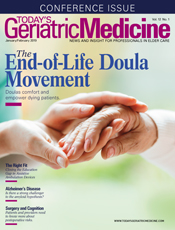
January/February 2019
The Last Word: Attitude Is Everything A friend called her 82-year-old stepmother to wish her a happy birthday, and—after a brief "thank you"—was met with a barrage of "Those doctors! Why do they treat me as if I were 3 years old? Like I can't think or know how to take care of myself. It's downright insulting!" I certainly can relate. I remember having that same feeling when a 20-something was texting away as our plane was ready for takeoff and I remarked that if he didn't obey the flight attendant's instruction to "put your devices in airplane mode," his cell's frequencies could interfere with the pilot's radio transmissions. His response was, "What would you know? You're old." To him, I, at 60, somehow had lost all capacity to understand basic technology. I was automatically tagged as ignorant. Too often, we assume that having a goodly number of years under our belt means that we've declined, that our intelligence is less, our abilities impaired. Maybe in some cases that's true, but it's important not to approach your patients with the underlying assumption that all older individuals are diminished. That's definitely not the case. Groundbreaking research done by a group of Harvard psychologists, spearheaded by Ellen Langer, PhD, and highlighted in her 2009 book Counterclockwise: Mindful Health and the Power of Possibility, showed that when, during a one-week retreat, a group of subjects aged 75 and older were treated in the same manner and with the same respect as they were in their 50s, their fingers lengthened and their joints became more flexible. Their posture began to straighten, resembling more the posture they had when they were younger. Their muscle strength improved, as did their hearing and eyesight. In addition, more than one-half of the subjects scored higher on IQ tests after the experiment, even though intelligence is usually considered unchangeable once you've reached adulthood. All this after only one week. How you approach your patients matters. When you adopt a "they're old, they won't understand, they aren't as swift as younger patients" attitude, you not only do them a terrible disservice but also impede their progress toward health and well-being. Think of your older patients as 50-year-olds with a few more wrinkles. Make that your starting point. Engage them as you would younger individuals—with respect always, with humor when appropriate. For example, train yourself to say, "I always provide written as well as verbal medication instructions, so here you go," or "I'm hopeless when I don't write things down, so I've provided you with written as well as my verbal medication instructions," instead of saying, "Now when you get forgetful or confused, you have these written down too," or, worse, "Because you're older, you're likely to forget how to take your medicine, so I wrote it down for you." For those of your older patients who refer to themselves as old, with the implication that decline is inevitable, respond with a gentle reframe. For example: Patient: I'm getting old, that's all there is to it. Why is this important? A study by Yale researchers asked people then in their 50s or older to agree or disagree with statements such as, "Do you think that things will get worse as you get older?" "Do you think you'll be less useful as time goes on?" "Do you think you'll be as happy as you were in your youth?" Twenty-three years later, it was found that people who viewed aging more positively lived an average of 71/2 years longer than did those who viewed it more negatively. Simply having a positive attitude made more of a difference on longevity than did blood pressure, cholesterol levels, body weight, exercise, or smoking.1 The less you buy into your patients' "old" mentality, the more you help them rediscover a measure of self-confidence and self-esteem, both of which greatly support their health and well-being. Attitude matters. Let yours matter, and with that, watch your patients stand taller, smile more, and be their best selves—mentally, emotionally, and physically. — Noelle Nelson, PhD, is a psychologist, author, and speaker. She's written more than a dozen books, including Happy Healthy … Dead: Why What You Think You Know About Aging Is Wrong and How to Get It Right, and has celebrated the stories of more than 200 thriving, inspiring individuals older than 60 in her "Meet The Amazings" Facebook page (www.facebook.com/MeetTheAmazings).
Reference |
